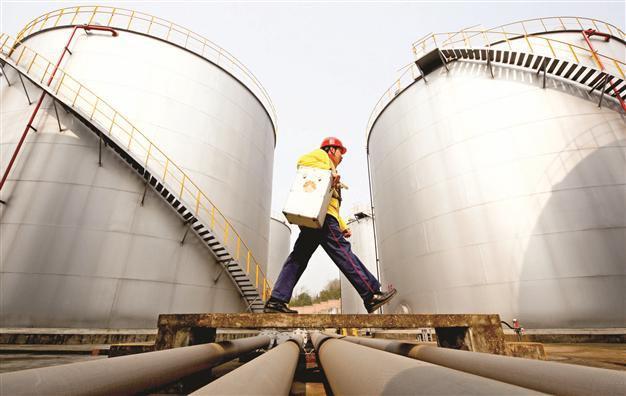Petrochina surpasses Exxon in oil production, figures show
NEW YORK - The Associated Press

A worker walks past tanks at a Petrochina storage base in Suining, China. AP photo
U.S. based Exxon Mobil is no longer the world’s biggest publicly traded producer of
oil.
For the first time, that distinction belongs to a 13-year-old Chinese company called PetroChina.
The Beijing company was created by the Chinese government to secure more oil for that nation’s booming economy.
PetroChina announced Wednesday that it pumped 2.4 million barrels a day last year, surpassing Exxon by 100,000. The company has grown rapidly over the last decade by squeezing more from China’s aging oil fields and outspending Western companies to acquire more petroleum reserves in places like Canada, Iraq and Qatar. It’s motivated by a need to lock up as much oil as possible.
The company’s output increased 3.3 percent in 2011 while Exxon’s fell 5 percent. Exxon’s oil production also fell behind Rosneft, the Russian energy company.
PetroChina’s rise highlights a fundamental difference in how the largest petroleum companies plan to supply the world as new deposits become tougher to find and more expensive to produce.
Conservative policy
Every major oil company has aggressively pursued new finds to replace their current wells. But analysts say Western oil firms like Exxon Mobil have been more conservative than the Chinese, mindful of their bottom line and investor returns. With oil prices up 19 percent in 2011, they still made money without increasing production.
PetroChina has a different mission. The Chinese government owns 86 percent of its stock and the nation uses nearly every drop of oil PetroChina pumps. Its appetite for gasoline and other petroleum products is projected to double between 2010 and 2035.
“There’s a lot of anxiety in China about the energy question,” says energy historian Dan Yergin. “It’s just growing so fast.” While PetroChina sits atop other publicly traded companies in oil production, it falls well short of national oil companies like Saudi Aramco, which produces nearly 8 million barrels a day. And Exxon is still the biggest publicly traded energy company when counting combined output of oil and natural gas. PetroChina ranks third behind Exxon and BP in total output of oil and natural gas.
“We must push ahead,” PetroChina chairman Jiang Jiemin said in January.
PetroChina has grown by pumping everything it can from reserves in China, estimated to contain more than 6.5 billion barrels. It drilled thousands of oil wells across vast stretches of the nation’s northern grasslands.
Some of those fields are ancient by industry standards, dating close to the beginning of China’s communist government in the 1950s. The commitment to aging fields distinguishes PetroChina from its biggest Western rivals. Exxon and other major oil companies typically sell their aging, low-performing fields, or they put them out of commission.
PetroChina also has been on a buying spree, acquiring new reserves in Iraq, Australia, Africa, Qatar and Canada. Since 2010, its acquisitions have totaled $7 billion, about twice as much as Exxon, according to data provider Dealogic.
